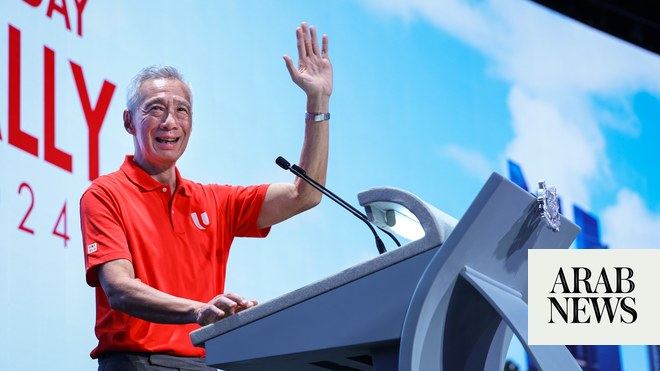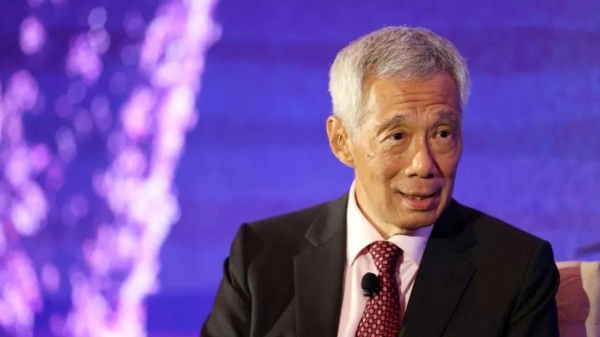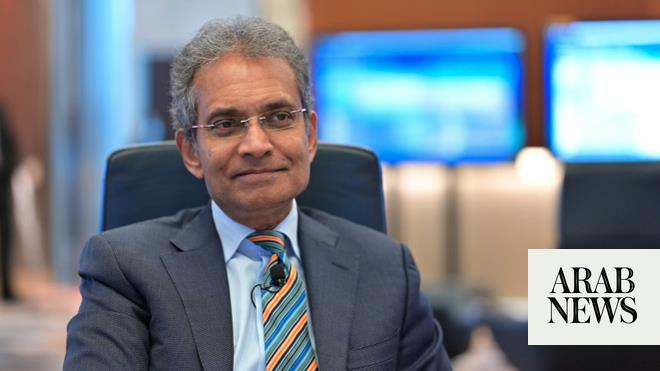
PM Lee Hsien Loong will hand over reins to his deputy Lawrence Wong
Outgoing premier will remain as senior minister in the new cabinet
SINGAPORE: Singapore’s Prime Minister Lee Hsien Loong stepped down on Wednesday, marking the end of an era after nearly two decades in office.
Lee is the son of Lee Kuan Yew, the founder of modern Singapore who stayed in politics until his death in 2015.
His resignation ended a family dynasty, as he formally handed over the reins to his deputy, Lawrence Wong.
As Singapore’s third premier, Lee oversaw his country’s economic growth into an international financial hub and top tourist destination. The island’s gross domestic product per capita more than doubled during his tenure, with the government also credited for competently steering the country through several recessions and successfully fighting the COVID-19 pandemic.
Lee’s succession has been planned for years, but the transition was delayed due to the COVID-19 pandemic. The 72-year-old will remain in Wong’s cabinet as senior minister, as former Singapore premiers have done.
In his final major speech on May 1, Lee urged Singaporeans to rally behind Wong and said that the country’s stable politics had made long-term planning possible.
“As I prepare to hand over Singapore in good order to my successor, I feel a sense of satisfaction and completeness. I have done my duty, and I am very happy I chose this path of public service all those many years ago,” he said.
“But leading a country is never a one-man job. It is always the effort of a national team. Your unwavering support enabled us to get here, with the country in good shape and heading in the right direction.”
Anand Gopalan, who runs a financial and strategy advisory firm, said Singapore managed to keep up with the times under Lee’s leadership.
“With Lee Hsien Loong, … there’s a lot more focus on technology and innovation,” he said.
Singapore also saw growth in entrepreneurship and start-ups, as well as financial technology and artificial intelligence-focused platforms, giving citizens a vast range of career options, he added.
Though the city-state flourished into one of the world’s wealthiest nations, it also became one of the most expensive cities to live in.
“The big problems now are the diminishing jobs, both middle-class and working-class jobs, increased taxes and cost of living,” Gopalan said.
For 63-year-old Alice Rani, Singapore’s transformation throughout the years was commendable.
“I was born in 1961. There have been a lot of changes that sometimes I would say to myself: ‘Wow, it’s amazing what the government did for Singapore’,” Rani told Arab News.
“I like the way our government works, and everything is going (well). There is a lot of improvement, but it is a bit expensive to live here. We can still manage, and the government has been providing a lot of (subsidies and assistance).”
Singaporeans have enjoyed good infrastructure over the years, especially its transportation and pedestrian-friendly streets that are some of the best in Southeast Asia.
“I think for Singaporeans, they benefited a lot. Roads are better, flats are better, and the hawker centers are very convenient for people,” artist Margaret Pereira said.
“With the local infrastructure, there are more trains and train lines being built … There are a lot of differences in the past 20 years.”












